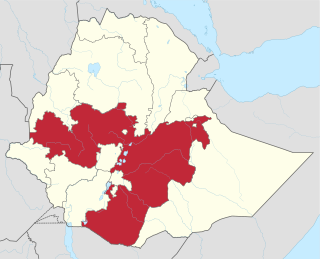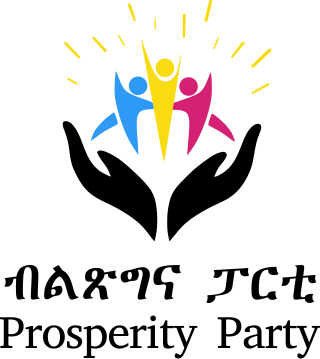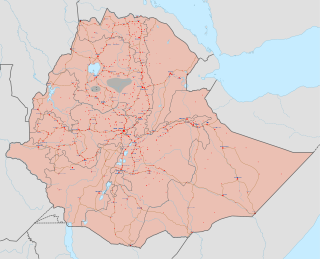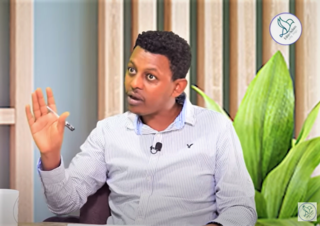Related Research Articles

The Oromo Liberation Front is an Oromo nationalist political party formed in 1973 to promote self-determination for the Oromo people inhabiting today's Oromia Region and Oromia Zone in the Amhara Region of Ethiopia. The OLF has offices in Addis Ababa,Washington,D.C.,and Berlin,from which it operates radio stations that broadcast in Amharic and Oromo.

The Oromo Liberation Army is an armed opposition group active in the Oromia Region of Ethiopia. The OLA consist primarily of former armed members of the pre-peace deal Oromo Liberation Front (OLF) who refused to disarm out of skepticism of the peace deal,and former youth protestors who grew disillusioned with nonviolent resistance.

The Council of Ministers is the cabinet of the Government of Ethiopia. Under the Constitution of Ethiopia,the Council of Ministers is the country's executive body.

The Oromo conflict or Oromia conflict is a protracted conflict between the Oromo Liberation Front (OLF) and the Ethiopian government. The Oromo Liberation Front formed to fight the Ethiopian Empire to liberate the Oromo people and establish an independent state of Oromia. The conflict began in 1973,when Oromo nationalists established the OLF and its armed wing,the Oromo Liberation Army (OLA). These groups formed in response to prejudice against the Oromo people during the Haile Selassie and Derg era,when their language was banned from public administration,courts,church and schools,and the stereotype of Oromo people as a hindrance to expanding Ethiopian national identity.

Abiy Ahmed Ali is an Ethiopian politician who is the current Prime Minister of Ethiopia since 2018 and the leader of the Prosperity Party since 2019. He was awarded the 2019 Nobel Peace Prize "for his efforts to achieve peace and international cooperation,and in particular for his decisive initiative to resolve the border conflict with neighbouring Eritrea". Abiy served as the third chairman of the Ethiopian People's Revolutionary Democratic Front (EPRDF) that governed Ethiopia for 28 years and the first person of Oromo descent to hold that position. Abiy is a member of the Ethiopian parliament,and was a member of the Oromo Democratic Party (ODP),one of the then four coalition parties of the EPRDF,until its rule ceased in 2019 and he formed his own party,the Prosperity Party.

The Oromia Broadcasting Network (OBN) is an Ethiopian public service broadcaster headquartered in Addis Ababa,Ethiopia. It is the leading media organization in Oromia and broadcasts on Eutelsat via the Ethiosat platform.

The 2021 Ethiopian general election to elect members of the House of Peoples' Representatives was held on 21 June 2021 and 30 September 2021. Regional elections were also held on those dates.
The Burayu massacre was a series of communal clashes which occurred in the vicinity of the Ethiopian town of Burayu,in the Oromia Region,on 14–16 September 2018. Individuals from the Oromo and Dorze ethnicities fought in and around Burayu,a town in Oromia Region which is located near the northwest boundary of Addis Ababa,the federal capital. Different sources cite number of civilians killed both from Oromo and non-Oromo ethnicity.

The Prosperity Party is a ruling political party in Ethiopia that was established on 1 December 2019 as a successor to the Ethiopian People's Revolutionary Democratic Front by incumbent Prime Minister Abiy Ahmed.

The Council of Ministers of Abiy Ahmed is the cabinet of the government of Ethiopia during the premiership of Abiy Ahmed since early 2018.

The ongoing Ethiopian civil conflict began with the 2018 dissolution of the Ethiopian People's Revolutionary Democratic Front (ERPDF),an ethnic federalist,dominant party political coalition. After the 20-year border conflict between Ethiopia and Eritrea,a decade of internal tensions,two years of protests,and a state of emergency,Hailemariam Desalegn resigned on 15 February 2018 as prime minister and EPRDF chairman,and there were hopes of peace under his successor Abiy Ahmed. However,war broke out in the Tigray Region,with resurgent regional and ethnic factional attacks throughout Ethiopia. The civil wars caused substantial human rights violations,war crimes,and extrajudicial killings.

The OLA insurgency was an armed insurgency between the Oromo Liberation Army (OLA),which split from the Oromo Liberation Front (OLF) in 2018,and the Ethiopian government,continuing in the context of the long-term Oromo conflict,typically dated to have started with the formation of the Oromo Liberation Front in 1973.

The Persecution of Amhara people is the ongoing persecution of the Amhara and Agew people of Ethiopia. Since the early 1990s,the Amhara people have been subject to ethnic violence,including massacres by Tigrayan,Oromo and Gumuz ethnic groups among others,which some have characterized as a genocide. Large-scale killings and grave human rights violations followed the implementation of the ethnic-federalist system in the country. In most of the cases,the mass murders were silent with perpetrators from various ethno-militant groups—from TPLF/TDF,OLF–OLA,and Gumuz armed groups.
The 1995 Ethiopian Federal Constitution formalizes an ethnic federalism law aimed at undermining long-standing ethnic imperial rule,reducing ethnic tensions,promoting regional autonomy,and upholding unqualified rights to self-determination and secession in a state with more than 80 different ethnic groups. But the constitution is divisive,both among Ethiopian nationalists who believe it undermines centralized authority and fuels interethnic conflict,and among ethnic federalists who fear that the development of its vague components could lead to authoritarian centralization or even the maintenance of minority ethnic hegemony. Parliamentary elections since 1995 have taken place every five years since enactment. All but one of these have resulted in government by members of the Ethiopian People's Revolutionary Democratic Front (EPRDF) political coalition,under three prime ministers. The EPRDF was under the effective control of the Tigray People's Liberation Front (TPLF),which represents a small ethnic minority. In 2019 the EPRDF,under Abiy,was dissolved and he inaugurated the pan-ethnic Prosperity Party which won the 2021 Ethiopian Election,returning him as prime minister. But both political entities were different kinds of responses to the ongoing tension between constitutional ethnic federalism and the Ethiopian state's authority. Over the same period,and all administrations,a range of major conflicts with ethnic roots have occurred or continued,and the press and availability of information have been controlled. There has also been dramatic economic growth and liberalization,which has itself been attributed to,and used to justify,authoritarian state policy.
On 18 June 2022,the Oromo Liberation Army (OLA) was accused of massacring over 500 Amhara civilians in the Gimbi county of Oromia Region,Ethiopia. Witnesses said that the OLA intentionally targeted ethnic Amhara people. This attack is part of a series of Amhara massacres that occurred in 2022.
On July 4,2022,alleged Oromo Liberation Army militants killed hundreds of civilians in Kelam Welega Zone,Oromia in Ethiopia. The massacre sparked condemnation from Ethiopian prime minister Abiy Ahmed,and was the second mass killing in Oromia region after the Gimbi massacre just a week prior. Qelem is also known as Kellem.

Oromo nationalism is an ethnic nationalism advocating the self-interest of Oromo people in Ethiopia and Kenya. Many Oromo elites,intellectuals and political leaders struggled to create an independent Oromia state throughout 19th and 20th century,since the start of Abyssinian colonialism under Emperor Menelik II. No consensus has been reached yet regarding the motives of this type of nationalism,whether the Oromos librate themselves to form a nation-state or offer self-determination in federal Ethiopia.

Political repression is a visible scenario under the leadership of Prime Minister Abiy Ahmed after 2018,characterized by severe human rights violation,restriction of press,speeches,dissents,activism and journalism that are critical to his government. Similar to TPLF-led EPRDF regime,there was a raise of censorship in the country,particularly internet shutdowns under the context of anti-terror legislation labelling them "disinformation and war narratives" since the raise of armed conflict in Ethiopia. In June 2018,Abiy unblocked 64 internet access that include blogs and news outlets.
The OLA peace process is a set of negotiations,agreements and actions to end the insurgency of the Oromo Liberation Army (OLA),which split from its wing,the Oromo Liberation Front (OLA) and rebels against the Ethiopian federal government since 2018. The Oromia region has experienced prolong conflict and instabilities first initiated by OLF with successive Ethiopian government since 1973.
Koree Nageenyaa translated as Security Committee from Oromo language,is a secret Ethiopian government agency allegedly responsible for orchestrating executions within Ethiopia and more specifically in the regional state of Oromia. Koree Nageenyaa is believed to be composed of high-ranking individuals in Oromia,the biggest and most densely populated region in Ethiopia,has purportedly issued directives for unlawful detentions and extrajudicial killings with the aim of suppressing an uprising.
References
- 1 2 "PM Abiy forms new gov't; adds 20 institutions including NISS, INSA, investment & financial security accountable to his office". Addis Standard . 6 October 2021. Wikidata Q117572995. Archived from the original on 11 April 2023.
- 1 2 3 "Abiy Ahmed's New Cabinet: Changes and New Inclusions". MENAFN. 7 October 2021. Wikidata Q117629786. Archived from the original on 12 April 2023.
- ↑ Ethio FM 107.8 (9 June 2020), የኦሮሚያ ክልል መንግስት ብስለት ከጎደለው መግለጫው እንዲታቀብ ኦነግ አሳሰበ። (in Amharic), Wikidata Q117626613, archived from the original on 12 April 2023
{{citation}}: CS1 maint: numeric names: authors list (link) - 1 2 3 "Kejela Merdassa, Top OLF man thinks radical groups get support from govt". Borkena. 23 March 2021. Wikidata Q117628488. Archived from the original on 12 April 2023.